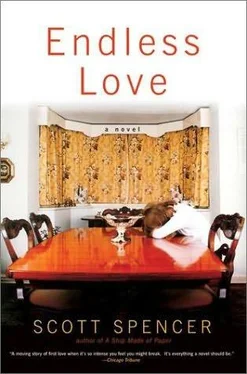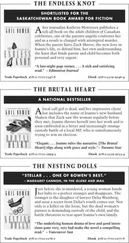“Oh, they’re right here,” I said.
“I was wondering what you were holding in there,” she said, with a kind of embryonic brightness that made me fear all the others might turn on us. I knew that Ann was asking me to conspire with her, to move back with her a step or two and view everything with a kind of private, wounded mirth. Surrounded by tragedy, overcome by everyone else’s grief as well as her own, Ann was nostalgic for her irony: she longed for a taste of it, as if that small space that irony places between consciousness and emotion contained the only air she could comfortably breathe. She waited for me to say something, but I only looked at her and then at the bag I was holding, which was dark with moisture. “Well, good,” Ann said. “You brought it. I’ll put it all in the kitchen.”
“No, I will,” I said.
“No, I will,” said Keith. He was at my side in an instant and took the bag from my arms. “I’d like to talk to you,” he said, just above a whisper.
I nodded. “Good.”
“I’ll put this shit away and then we’ll go to Mom’s room and talk.”
“Ann, Ann,” Ingrid was saying, “we have to be clear about everything.” She was rubbing the side of her face and holding her sister’s hand. “We have to make ground rules.”
Ann folded her arms in front of her and nodded. “You’ve been saying that all afternoon, Ingrid. As far as I can see, there’s nothing to be decided. You chose the chapel. The ashes are being divided up. What more is there?”
“There’s a lot. Everything. Everything.” Ingrid looked at her sister—a chubby, mild, nunnish-looking woman—and her sister closed her eyes in that way that means “Go ahead and say it.”
Keith brushed my arm with the back of his hand. “Come on. We’ll talk.”
“Where you going?” Sammy asked.
“We’ll be right back. Stay here,” said Keith.
Sammy shook his head and looked disgusted.
I followed Keith into Ann’s bedroom and he closed the door behind us. I felt that gesture of closing the door was the beginning of a reprimand—we were certainly not here to exchange confidences as equals—and the dull bloated thud of the heat- warped door felt like one of those ambiguous affronts to your dignity, a hearty slap on the back or a pinch on the cheek.
The windows in Ann’s bedroom, framed by sheer white curtains, looked out onto a reddish brick wall. The glass in the windows had the clean look windows have in houses that haven’t been occupied yet, and you could see the wall with such vivid clarity that it became beautiful, strangely exciting. I turned and saw that Keith was staring at me, his mouth refined down to a thin, pale line.
“So,” said Keith. “Mom tells me you materialized Friday afternoon. Is that true?”
I felt, acutely, that Keith was doing wrong to check my version against what Ann had said, but I nodded. “Late Friday afternoon.”
“Mom says it was about three.”
I paused. “I don’t know. Probably it was.”
“Was she real surprised to see you?”
“What do you think?”
Keith shrugged, and lifted one of the corners of his mouth in a little twitchy smile. “I don’t know. That’s why I’m asking you. If I knew…” his voice was absorbed by his largest instinct, which was to say nothing to me.
“She was surprised.”
“Well,” Keith said, drawing out the word, like a small-town cop on television, that long drawl of folksy menace, “I guess it was the next step.”
“I don’t know what you’re going after, Keith. Tell me what you want to know and I’ll tell you.”
“All I’m saying is I guess it was the next step. I mean, if you were busy writing me letters—I mean to me, and you know how I feel—then I guess Mom got quite a few of them. Quite a few. Is that right?”
I had a suspicion that Ann had said something to the contrary. Perhaps she’d confessed only to a note; likely as not, she’d said she never replied. “I found out where you lived in the telephone book.”
“I know. But that’s not how you found Mom. She’s not listed under her name.”
“She’s under her maiden name. Ramsey. I remembered it.”
“You remembered it?” He seemed disturbed that I knew his mother’s family name. I had once again put my fingerprints on his past. “OK,” he said, as much to himself as to me, “so you remembered it. And you wrote her. And you told her how sorry you were, and how lonely, and how it wasn’t fair what happened to you—”
“I never said it wasn’t fair, Keith. What happened to me, I mean to all of us, can’t be touched by words like fair.”
He dismissed what I was saying with a wave. “So you wrote her and said how sorry you were and she wrote you back. What did she say in her letters? That she knew you were sorry and it was time to let bygones be bygones?”
I felt, and was, trapped. It wasn’t a question of whether I should lie to Keith in order to protect Ann, but whether she had already confessed to answering my letters.
“She answered my letters. But she never said she was sorry for me, and you know Ann would never say it was time to let bygones be bygones.”
Keith’s face creased in that sort of smile one makes when the triumph is proving you’ve been betrayed. I knew I’d lost the maneuver, but it was hard to care.
“I thought so,” he said.
I made no reply; there was no point in inviting him to illustrate the deceit he’d uncovered. I’d taken a chance and it flopped: I knew now that Ann had told him she’d never answered my letters.
“I don’t want to argue with you, Keith,” I said. “None of this is important today.”
“Bygones?” He was lifting his spirits. His life was more than a little berserk and it gave him a feeling of control to poke butterfly pins through whatever I said.
“No. I’m not talking about forgetting anything. I don’t believe in forgetting any more than you do.”
“That’s funny,” he said. “I think if I were you there’d be a lot I would want to forget.”
We were standing in the center of Ann’s bedroom. Her bed, covered by an Indian print spread, was on one side of us and a painted dresser and an upholstered chair were on the other. I took a step back so that if Keith tried to hit me, I wouldn’t catch it full force.
“You obviously don’t want me here,” I said. “What did you say when Ann said she wanted to ask me to come?”
Keith stepped forward and I readied myself for defense, but he was moving past me now, toward Ann’s bed. He gazed at it and then softly, as if it were a living thing, set his open hand down upon it. He turned around and sat on the edge of the bed and then, with an abrupt, clumsy motion, he lay down, propped against the simple wooden headboard, with his sandals on the colorful spread. He kept his hands beside him and drummed his fingers slowly, one at a time, as if he were counting down. Then he reached behind him and pulled a pillow from under the bedspread and placed it on his belly.
“You came here to see my sister?”
“Your mother asked me to come.”
Keith was silent, his face flushed momentarily and his eyes seemed to recede. He took a slow, deep breath.
“She doesn’t want to see you. She hates you. She knows what you are. You’re using my mother. You’re just using her to get to Jade, but Jade would rather still be trapped in that burning house than see you.”
“Keith, if—”
“And Jade has a lover, you know. She’s had plenty. Terrific appetite on that girl. She has a female lover. Did you know that?”
He waited for me to answer and finally I shook my head.
“Oh? So it’s news? Good. I’m glad I’m the one to tell you. Her name is Susan Henry, Jade’s girlfriend. They sometimes stay at my house in Bellows Falls.” He unfolded his hands and squeezed the pillow he’d lain over his belly. He was flexing his long, perfectly articulated toes against the bottoms of his sandals, in and out like the beating of a heart.
Читать дальше












